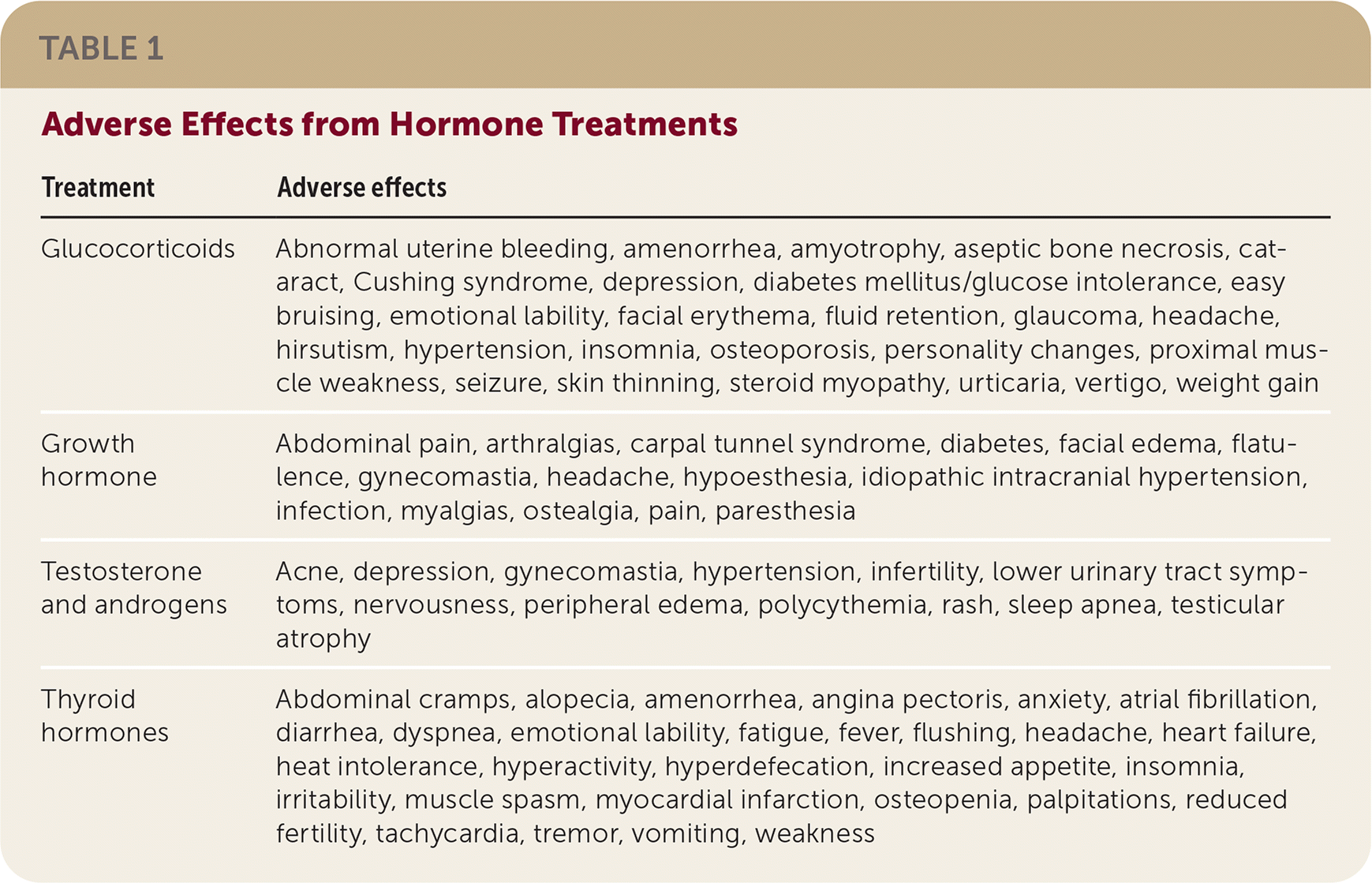
Am Fam Physician. 2020;102(12):759-760
Author disclosure: No relevant financial affiliations.
Key Points for Practice
• Exercise, weight loss, and better sleep will improve symptoms of hypogonadism in people with testosterone levels as low as 264 ng per mL.
• Growth hormone supplementation does not improve physical or cognitive performance in athletes or older adults.
• Thyroid supplementation for euthyroidism does not improve muscular, psychologic, or cognitive function and does not reduce weight in obesity.
• Adrenal fatigue is not a recognized condition and treatment does not improve symptoms. Supplements labeled for adrenal support often contain thyroid and steroid hormones, even when labeled hormone free.
From the AFP Editors
Off-label use of hormone medications and use of hormone supplements have increased dramatically over the past 20 years. Common nonspecific symptoms such as fatigue, low energy, poor sleep, weight gain, and lower libido are often assumed to be caused by hormone deficiencies, leading to treatment without an identified deficiency. An example is the concept of adrenal fatigue, a proposed condition that cannot be directly assessed. The risks of using hormone supplements can be substantial, and these supplements do not have demonstrated offsetting benefits. The American Association of Clinical Endocrinologists (AACE) and the American College of Endocrinology (ACE) developed a summary of known risks of using off-label hormone treatments.
Testosterone and Androgens
Although androgens such as testosterone are one treatment for male hypogonadism, most men receiving treatment do not meet diagnostic criteria for hypogonadism. Only one in 10 patients with a testosterone prescription had testosterone levels measured within six months. Studies suggest that testosterone levels as low as 264 ng per mL (9.16 nmol per L) are normal, and many patients with borderline levels can be treated with exercise, weight loss, and improved sleep. Although testosterone levels decline with obesity, hypertension, hyperlipidemia, type 2 diabetes mellitus, and obstructive sleep apnea, the U.S. Food and Drug Administration has concluded that effectiveness and safety of testosterone replacement have not been established for these patients.
Testosterone is the most common anabolic steroid used by bodybuilders and athletes. In younger people, exogenous androgens can reduce fertility, causing decreased spermatogenesis, and can lead to acne and polycythemia (Table 1).
The safety of testosterone therapy has not been evaluated in large, long-term trials. Its effect on cardiovascular events is uncertain, and it can increase progression of metastatic prostate cancer.
Growth Hormone
Similar to androgens, growth hormone is commonly used by athletes to enhance performance and is prescribed to older adults to combat the effects of aging. In athletes, limited data suggest that growth hormone slightly increases lean body mass and decreases fat mass without improving strength or performance. Results are similar in older adults, with body composition improvements but no change in functional capacity, strength, or on other effects of aging.
In clinical trials, nearly one-half of healthy adults have adverse effects from growth hormone supplementation, including arthralgias, myalgias, carpal tunnel syndrome, and gynecomastia (Table 1). Adverse effects are more common in older adults and with increased, particularly supraphysiologic, dosages.

| Treatment | Adverse effects |
|---|---|
| Glucocorticoids | Abnormal uterine bleeding, amenorrhea, amyotrophy, aseptic bone necrosis, cataract, Cushing syndrome, depression, diabetes mellitus/glucose intolerance, easy bruising, emotional lability, facial erythema, fluid retention, glaucoma, headache, hirsutism, hypertension, insomnia, osteoporosis, personality changes, proximal muscle weakness, seizure, skin thinning, steroid myopathy, urticaria, vertigo, weight gain |
| Growth hormone | Abdominal pain, arthralgias, carpal tunnel syndrome, diabetes, facial edema, flatulence, gynecomastia, headache, hypoesthesia, idiopathic intracranial hypertension, infection, myalgias, ostealgia, pain, paresthesia |
| Testosterone and androgens | Acne, depression, gynecomastia, hypertension, infertility, lower urinary tract symptoms, nervousness, peripheral edema, polycythemia, rash, sleep apnea, testicular atrophy |
| Thyroid hormones | Abdominal cramps, alopecia, amenorrhea, angina pectoris, anxiety, atrial fibrillation, diarrhea, dyspnea, emotional lability, fatigue, fever, flushing, headache, heart failure, heat intolerance, hyperactivity, hyperdefecation, increased appetite, insomnia, irritability, muscle spasm, myocardial infarction, osteopenia, palpitations, reduced fertility, tachycardia, tremor, vomiting, weakness |
Thyroid Hormone
Symptoms that can be attributed to hypothyroidism commonly occur in euthyroidism, but treatment does not improve symptoms. Treatment also does not improve body composition or muscular, psychological, or cognitive function. In obesity, thyroid hormone supplementation does not result in sustained weight loss. Adverse effects include tachycardia, heat intolerance, amenorrhea, tremor, nervousness, and weakness.
Almost all supplements marketed for thyroid support contain active hormones, equivalent to up to 92 mcg of levothyroxine at recommended doses.
Glucocorticoids
Glucocorticoid supplements are often recommended for adrenal fatigue, a condition not recognized by endocrinology specialists. The many tests proposed to diagnose adrenal fatigue have not been well studied to develop reference standards. Supplements for adrenal support are often advertised as hormone free but may contain thyroid and steroid hormones. In addition to the adverse effects shown in Table 1, treatment for adrenal fatigue risks masking the diagnosis of adrenal insufficiency or other endocrine disorders.
Supplementation with pregnenolone or dehydroepiandrosterone (DHEA) does not improve well-being and commonly causes dermatologic and androgenic symptoms. Hydrocortisone and fludrocortisone treatments do not improve energy in chronic fatigue syndrome.
The views expressed are those of the author and do not necessarily reflect the official policy or position of the Department of the Navy, Uniformed Services University of the Health Sciences, Department of Defense, or the U.S. government.
Guideline source: American Association of Clinical Endocrinologists, American College of Endocrinology
Evidence rating system used? No
Systematic literature search described? Yes
Guideline developed by participants without relevant financial ties to industry? No
Recommendations based on patient-oriented outcomes? Yes
Published source: Endocr Pract. 2020;26(3):340–353
Available at: https://journals.aace.com/doi/full/10.4158/PS-2019-0540
